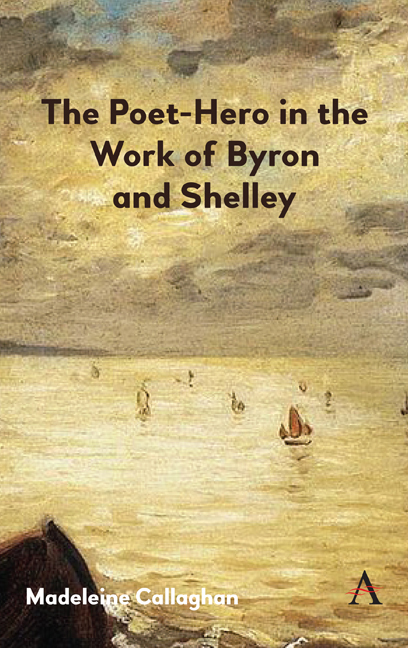Book contents
- Frontmatter
- Dedication
- Contents
- Acknowledgements
- Note on Texts and Abbreviations
- Introduction: The Poet-Hero: ‘Who shall trace the void?’
- Part I Byron
- Interchapter
- Part II Shelley
- Chapter Six ‘The Highest Idealism of Passion and of Power’: Shelley's Heroic Poetics in A Defence of Poetry, The Mask of Anarchy and Prometheus Unbound
- Chapter Seven ‘Holy and Heroic Verse’: The Revolutionary Poet-Heroes of Laon and Cythna
- Chapter Eight ‘This soul out of my soul’: The Trial of the Poet-Hero in Shelley's Epipsychidion
- Chapter Nine ‘His mute voice’: The Two Heroes of Adonais
- Conclusion The Byronic and the Shelleyan Poet-Hero
- Bibliography
- Index
Chapter Nine - ‘His mute voice’: The Two Heroes of Adonais
from Part II - Shelley
Published online by Cambridge University Press: 30 March 2019
- Frontmatter
- Dedication
- Contents
- Acknowledgements
- Note on Texts and Abbreviations
- Introduction: The Poet-Hero: ‘Who shall trace the void?’
- Part I Byron
- Interchapter
- Part II Shelley
- Chapter Six ‘The Highest Idealism of Passion and of Power’: Shelley's Heroic Poetics in A Defence of Poetry, The Mask of Anarchy and Prometheus Unbound
- Chapter Seven ‘Holy and Heroic Verse’: The Revolutionary Poet-Heroes of Laon and Cythna
- Chapter Eight ‘This soul out of my soul’: The Trial of the Poet-Hero in Shelley's Epipsychidion
- Chapter Nine ‘His mute voice’: The Two Heroes of Adonais
- Conclusion The Byronic and the Shelleyan Poet-Hero
- Bibliography
- Index
Summary
Adonais scrutinizes elegy's transcendental ambitions. Shelley tests ideas of transcendence and consolation through the poet-hero, having him strive to mourn for and move beyond the loss of Adonais. Complicating matters in Adonais is the fact that this figure is double in construction, at once the elegizing Shelley and the elegized Keats. Elegizing Keats was a significant act for the older poet, who had sought to act as Keats's protector, while engaging in poetic rivalry. These anxieties and tensions provide a partial explanation for Adonais's radical refiguring of the elegy. Shelley's impulse to centre his memorializing persona in the poem while simultaneously seeking to provide Keats with a fitting memorial typifies the double focus that runs through the poem. Adonais puts the genre of elegy on trial in order to interrogate its ability to accommodate two poet-heroes. Just as Shelley forces language to its breaking point in Epipsychidion, Adonais, written just after Epipsychidion, explores and comes close to exploding the genre it uses.
The elegy, as a genre, is an attempt to control the emotional maelstrom of loss surrounding the death of the elegized figure, often through what Sacks refers to as ‘the residually ceremonial structure of the elegy’. Lycidas furnished Shelley with a model of an elegy that created an individualized elegy even as it perfectly retained the conventions of the genre. As R. Clifton Spargo argues, Adonais goes further: ‘a large part of Shelley's revisionary contribution to the tradition of elegy, as I see it, is to draw out the crisis in ethical reciprocity suggested in “Lycidas” and to investigate the terms of self-interested mourning – terms whereby the poet's defenses are alerted not only to the other's plight, but to the very cause of poetry itself.’ Yet where Spargo sees Adonais as working to ‘signify an awareness that the reciprocity upon which the conventions of grief depend has suddenly lapsed’, I see Shelley as testing the efficacy of poetry and genre in order to discover if poetic language can, as A Defence of Poetry argues, ‘redeem[s] from decay the visitations of the divinity in man’ (A Defence of Poetry, 698). This responsibility forces the poet-hero not to assume that there will be transcendent moment embedded in the genre of elegy, but rather, to affect it for himself.
- Type
- Chapter
- Information
- The Poet-Hero in the Work of Byron and Shelley , pp. 191 - 206Publisher: Anthem PressPrint publication year: 2019



